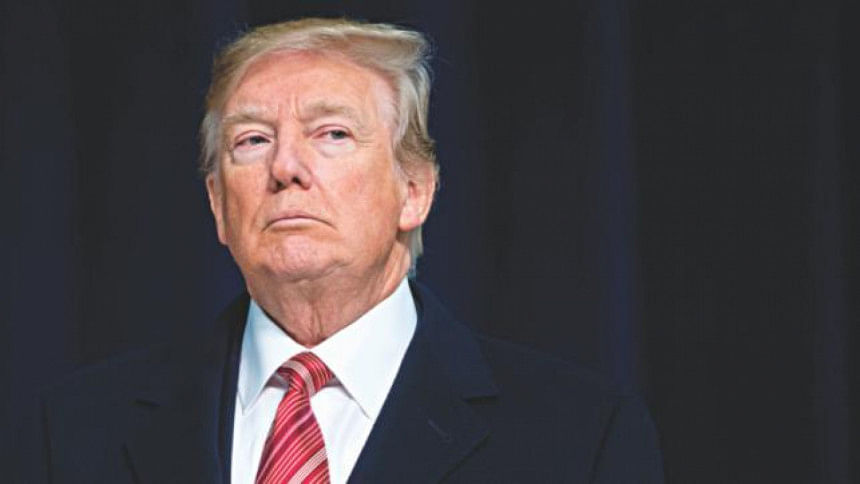Trump acknowledges paying adult film actress

President Donald Trump acknowledged for the first time in an ethics disclosure released on Wednesday that he repaid more than $100,000 to former personal attorney Michael Cohen, renewing questions about Trump's ties to adult film actress Stormy Daniels.
The disclosure underscored the inconsistency of explanations by Trump and aides about a $130,000 payment made by Cohen to Daniels before the 2016 presidential election to buy her silence over an alleged sexual encounter with Trump in 2006.
Signed by Trump and released by the US Office of Government Ethics, the disclosure also drew comment from watchdog groups and a senior Democratic lawmaker about possible violations of campaign finance law, which requires public disclosure of expenses meant to influence the election.Common Cause, a nonpartisan watchdog group in Washington, has filed a complaint with the US Federal Election Commission, claiming Trump broke the law when his campaign excluded details about the $130,000 payment in legally mandated filings.
Trump's acknowledgment that he reimbursed Cohen puts the president "at the middle of all of the campaign finance violations," said Paul S Ryan, head of litigation at Common Cause. "He knowingly and willfully caused his campaign to not disclose this expenditure, and that's a criminal violation."
The latest ethics disclosure did not describe the purpose or the recipient of the original 2016 payment to a "third party" made by Cohen, for which he was reimbursed by Trump.
Cohen has acknowledged paying Daniels, whose real name is Stephanie Clifford. Also, Rudy Giuliani, recently named Trump's personal attorney, has said Trump reimbursed Cohen for the original $130,000 payment, which was made shortly before Trump's victory in the Nov. 8, 2016 presidential election.
Trump had previously disputed whether he was aware of the payment by Cohen and whether he reimbursed him. In April, Trump told reporters he did not know anything about the payment. His disclosure now suggests Trump repaid Cohen last year.
Trump, his campaign and Cohen have all denied any wrongdoing. The White House did not respond to requests for comment to clarify the reason for Trump's payment to Cohen.
'FUNNELED MONEY'
Ethics disclosures are an annual requirement for senior federal officials and are overseen by the ethics office, a government office that provides oversight of an executive branch program to prevent and resolve conflicts of interest.
David Apol, the acting director of the ethics office, said in a letter to Deputy Attorney General Rod Rosenstein that the original payment made by Cohen should have been disclosed in ethics documents that Trump filed in June 2017. Apol's letter was released with the Trump disclosures.
Representative Elijah Cummings, top Democrat on the House of Representatives Oversight Committee, said in a statement he is pushing for the panel to investigate the payments.
"President Trump was required by law to report that he 'funneled' money through Michael Cohen to reimburse a secret payment to adult film star Stormy Daniels, but he concealed these payments, and we still do not know why," Cummings said.
CREW, a liberal-leaning watchdog group, filed a complaint with the ethics office that was referenced in Apol's letter.
"The disclosure substantiates our CREW complaint that the failure to do so previously was a violation of law," CREW's board Chairman Norman Eisen said. "That prior failure should be reviewed by the appropriate authorities."
'FULLY REIMBURSED'
The ethics disclosure said Cohen sought reimbursement in 2017 for an expense he incurred in 2016. "Mr. Trump fully reimbursed Mr. Cohen," the disclosure report said.
The payment made by Cohen was between $100,001 and $250,000 and there was no interest incurred, said the report, following the ethics office practice of reporting dollar amounts of payments and holdings in broad ranges.
Cohen has publicly acknowledged paying Daniels, saying he obtained the cash through a line of credit on his home. Daniels has sued to be released from her nondisclosure agreement.
In April, the Federal Bureau of Investigation raided Cohen's offices and home as part of a criminal investigation.
The ethics disclosure also showed Trump received more than $25 million in income in 2017 from Mar-a-Lago, his private club in Palm Beach, Florida, and more than $15 million in income from his golf club in Bedminster, New Jersey. Trump spends time and vacations at both clubs and sells memberships to Mar-a-Lago.
His continued ownership of the golf venues has been criticized by opponents, who say it blends personal and public business, allowing him to profit from the presidency.
While Trump's annual ethics disclosure reveals information about his personal finances, it lacks details of the sort found in an income tax return. Unlike past presidents of both parties in recent decades, Trump has refused to release his tax returns.


 For all latest news, follow The Daily Star's Google News channel.
For all latest news, follow The Daily Star's Google News channel. 








Comments